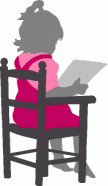Charging up the brain for reading
Some kids can become better readers if they learn how written letters match up with speech sounds.
Share this:
- Share via email (Opens in new window) Email
- Click to share on Facebook (Opens in new window) Facebook
- Click to share on X (Opens in new window) X
- Click to share on Pinterest (Opens in new window) Pinterest
- Click to share on Reddit (Opens in new window) Reddit
- Share to Google Classroom (Opens in new window) Google Classroom
- Click to print (Opens in new window) Print
By Emily Sohn
This is your brain. This is your brain when you’re reading.
If looking at these words makes you dizzy, you might benefit from a special reading program that can help kick your brain into gear, say researchers from the Yale University School of Medicine. The evidence for these benefits is in images of the brain at work when you try to read something.
 |
|
Some kids can become better readers if they learn how written letters match up with speech sounds.
|
At least one out of every five elementary school students in the United States has trouble learning to read, even when the students are good at other subjects. The biggest challenge for many of these kids, scientists say, is matching sounds with letters.
The Yale researchers studied a group of 6- to 9-year-old kids from New York and Connecticut. As part of the study, 37 struggling readers received special tutoring. Every day, an instructor worked with them individually on recognizing how written letters represent units of sound called phonemes. The students also got practice in reading aloud and spelling.
By the end of the school year, these kids could read faster than they could read before. They also made fewer mistakes, and they understood more of what they read than they could earlier in the year, the scientists found.
The researchers also used a special machine to take action photos of the kids’ brains. The pictures showed an increase in activity in the back of the brain on the left side. This is the same part of the brain that becomes active when good readers read.
This activated brain area appears to include a structure that helps people recognize familiar written words especially quickly. In poor readers, this structure remains inactive.
A year later, the brain structure was still working hard in the students who had gone through the special tutoring sessions, and the kids continued to score high on reading tests. Another group in the study who went through a more traditional reading program didn’t show the same progress.
Learning to read can be difficult. Some brains might just need the right kind of help to get started.






